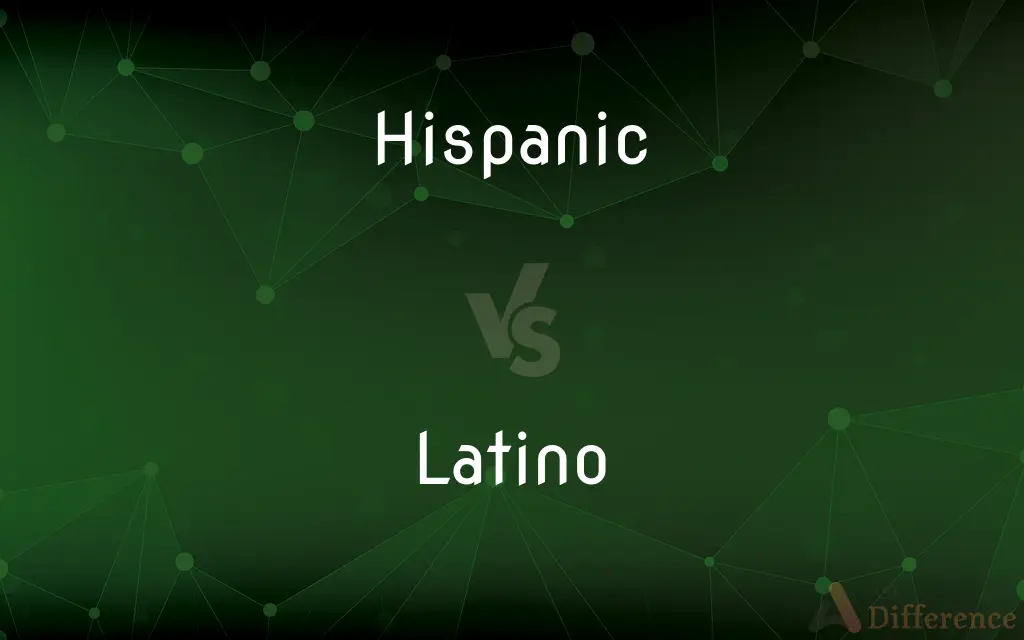Hispanic vs. Latino — What's the Difference?
By Tayyaba Rehman — Updated on September 21, 2023
Hispanic refers to people from Spanish-speaking countries, while Latino relates to people from Latin American countries. Both terms describe cultural and geographical ties, but they are not synonymous.

Difference Between Hispanic and Latino
Table of Contents
ADVERTISEMENT
Key Differences
Hispanic and Latino are terms often used interchangeably, yet they have distinct meanings. Hispanic is a term that primarily emphasizes a linguistic connection. It pertains to individuals who originate from countries where Spanish is spoken, including Spain. This means that a person from Spain is Hispanic, but not necessarily Latino since Spain is in Europe.
Conversely, Latino is a term that underscores a geographical link. It refers to people who hail from Latin America, regardless of their linguistic roots. Brazil, for example, is a Latin American country, but its official language is Portuguese. Thus, a Brazilian could be termed Latino but not Hispanic.
Adding to the layers of understanding, the term Latino excludes Spain, as Spain isn't part of Latin America. However, both Hispanic and Latino terms can be all-encompassing in the sense of encapsulating a broad cultural and community identity, especially in the United States. Over time, these definitions have evolved, and for many, the terms have taken on a personal and communal meaning beyond just geography or language.
It's crucial to approach these terms with sensitivity, acknowledging that individual preferences and self-identifications might differ. Some may prefer one term over the other or even use more specific identifiers based on nationality, such as "Mexican" or "Puerto Rican."
Comparison Chart
Origin
Spanish-speaking countries
Latin American countries
ADVERTISEMENT
Includes Spain?
Yes
No
Language Emphasis
Yes (Spanish)
No (Various languages in Latin America)
Includes Brazil?
No (Portuguese-speaking)
Yes
Primary Association
Linguistic
Geographical
Compare with Definitions
Hispanic
Pertaining to Spanish-speaking origin or countries.
Maria is Hispanic because she's from Spain.
Latino
Of or related to Latin American origin or countries.
He identifies as Latino because he's from Brazil.
Hispanic
Embracing a broad cultural identity linked to Spanish speakers.
The Hispanic community gathered for the annual festival.
Latino
Relating to a culture or community from Latin America.
Latino festivals are vibrant and colorful.
Hispanic
Of or linked to Spain or Spanish-speaking Latin America.
They celebrated Hispanic Heritage Month at school.
Latino
Encompassing people from South and Central America, and the Caribbean.
The Latino diaspora has made significant contributions to music.
Hispanic
Denoting linguistic roots tied to the Spanish language.
The book was translated into Hispanic dialects.
Latino
Not necessarily tied to the Spanish language alone.
Portuguese and Spanish are both spoken by Latino communities.
Hispanic
The term Hispanic (Spanish: hispano or hispánico) refers to people, cultures, or countries related to Spain, the Hispanidad, Spanish language, culture, or people. The term commonly applies to countries with a cultural and historical link to Spain, formerly part of the Spanish Empire following the Spanish colonization of the Americas, parts of the Asia-Pacific region and Africa.
Latino
A member of one of the Spanish-speaking peoples of the Americas.
Hispanic
Of or relating to Spain or Spanish-speaking Latin America.
Latino
A descendant of any of these peoples, especially when living in the United States. See Usage Note at Hispanic.
Hispanic
Of or relating to a Spanish-speaking people or culture.
Latino
Alternative case form of Latino
Hispanic
A Spanish-speaking person.
Latino
An American whose first language is Spanish
Hispanic
A US citizen or resident of Latin American or Spanish ancestry.
Latino
An artificial language based on words common to the Romance languages
Hispanic
Of or pertaining to Spain or its language; as, Hispanic words.
Latino
Related to or derived from the people or culture of Spain;
The Hispanic population of California is growing rapidly
Hispanic
An American whose first language is Spanish
Latino
Reflecting a broad cultural identity linked to Latin America.
The Latino vote is crucial in some U.S. states.
Hispanic
Related to or derived from the people or culture of Spain;
The Hispanic population of California is growing rapidly
Hispanic
Relating to a culture or community that speaks Spanish.
Hispanic traditions are deeply valued in her family.
Common Curiosities
How should I address someone: as Hispanic or Latino?
It's best to ask for individual preference or use specific nationalities (e.g., Colombian or Salvadoran).
Can someone be both Hispanic and Latino?
Yes, for example, a person from Mexico is both Hispanic (Spanish-speaking) and Latino (from Latin America).
Is a person from Spain considered Latino?
No, they are Hispanic (because Spain is Spanish-speaking) but not Latino (as Spain isn't in Latin America).
Is a Brazilian person Hispanic?
No, because Brazil's official language is Portuguese. However, Brazilians are Latino.
How have these terms evolved over time?
Both have grown to encompass broader cultural and community identities, especially within the U.S. context.
Are the terms Hispanic and Latino interchangeable?
While often used interchangeably, they have distinct meanings based on language and geography.
Which term is more popular in the U.S.?
Both terms are widely used, but preference can vary by region and individual.
Are there gender-neutral alternatives to these terms?
Yes, "Latinx" is sometimes used as a gender-neutral alternative to Latino/Latina.
Why is understanding the difference important?
Recognizing the difference respects individual identities and acknowledges diverse cultural backgrounds.
Are there other terms linked to these identities?
Yes, terms like Chicano, Boricua, and more can relate to specific heritages or self-identifications.
Share Your Discovery

Previous Comparison
Buying vs. Purchasing
Next Comparison
Fans vs. FanAuthor Spotlight
Written by
Tayyaba RehmanTayyaba Rehman is a distinguished writer, currently serving as a primary contributor to askdifference.com. As a researcher in semantics and etymology, Tayyaba's passion for the complexity of languages and their distinctions has found a perfect home on the platform. Tayyaba delves into the intricacies of language, distinguishing between commonly confused words and phrases, thereby providing clarity for readers worldwide.














































